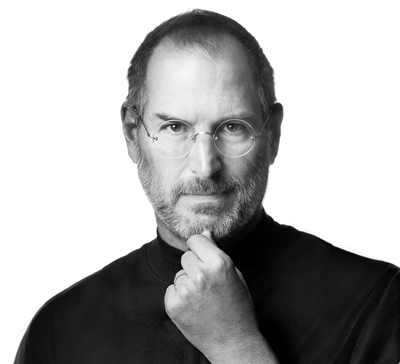A couple of weeks ago I decided to change the wallpaper on my computer.
Now, when I log in, I see a stern and determined, bearded face staring intently towards me. There is no doubting the resolve in the eyes. It is a face which invites trust, but also has a certain edge. It is a face not to be denied, not to be resisted. And a left hand touches the chin, the edge of the beard, as if to indicate both thought, and decisiveness.
It is, what they call, an ‘iconic’ image.
But it is not a religious icon. It is not a picture of Christ or one of the saints. It is a black and white photograph, taken in 2006. It is an image of a man who died on October 5th 2011, the technological inspiration and entrepreneur, the founder of Apple, Steve Jobs.
So why would I, a religious man, a priest of the Catholic Church, have a picture of a business man - even a successful one - for his computer wallpaper?
Well, firstly, and I must be honest here, it is because I love the stuff he created. First it was an iPod, then when my old computer needed replacing it became an iMac, then an iPhone … It almost embarrasses me to continue. Like a religious convert, I have become an Apple geek and, in my worst moments, look down with technological snobbery on run-of-the-mill laptops and mobile phones. In my defence, I have to make clear that these are not just the most beautifully designed gadgets, gadgets which have broken new ground and have been widely copied, but also ones that work extremely well and without doubt help me in my work.
But in addition to the worldliness of my purchases, the devout might also complain that Jobs is an unworthy hero for a Christian minister. After all, he could be ruthless in his determination. Even his admirers admit he could be difficult to work with. And his own religious beliefs seem far from Christian. He became a Buddhist, and said “Don't be trapped by dogma — which is living with the results of other people's thinking.”
In a sweet irony an evangelical pastor in the United States summed up the dilemma. He tweeted that Jobs, an unbeliever, would now be suffering in the fires of hell. Unfortunately (for the pastor) he forgot to delete the automatically inserted conclusion of his message: “- sent from my iPhone”.
I, despite my adherence to dogma (which Jobs so clearly rejected), cannot share the cruel certainly of the American pastor. For good reason. God’s judgment is precisely that, and is not for me to pronounce.
I do believe what my Church teaches, that on death we proceed not straight to heaven, but immediately to God’s judgment. And he is a just and merciful judge who rejoices in human achievement and laments human frailty. In Catholicism we recognise that there may be those who come before God not in soaked in wickedness, yet not ready to enter immediately heaven. We call this sensible dogma “purgatory”, an occasion for preparation for eternal life.
And I also believe that those who do not embrace the Christian faith, may nevertheless in this life have a glimpse of its truth.
In a moving biographical speech in 2005, Jobs said:
“Remembering that I'll be dead soon is the most important tool I've ever encountered to help me make the big choices in life. Because almost everything — all external expectations, all pride, all fear of embarrassment or failure - these things just fall away in the face of death, leaving only what is truly important.”
Or as St Paul wrote “Death where is your victory? Death where is your sting?”
